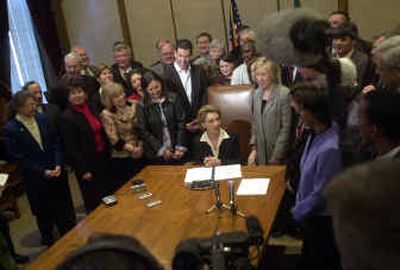The big six

Election reform
In the wake of Washington’s closest-ever governor’s race, Secretary of State Sam Reed and several lawmakers are proposing a list of changes to the state’s election system.
Where things stand: Senate and House leaders are talking about bills, but first they want to hear back from an election task force that held hearings statewide, including one last week in Spokane. Very likely, though: making the September primary earlier in the year and making it easier for counties to vote entirely by mail.
Taxes and fees
New taxes are critical to avoid lasting damage to the state’s schools, colleges and social services, lame-duck Gov. Gary Locke said as he was preparing to leave Olympia. No way, say Republicans, who maintain that virtually any new taxes would hurt the economy. Gov. Christine Gregoire says she wants to see what a no-new-taxes budget would look like before she’ll consider tax increases.
Where things stand: A hearing is slated this week on a big boost in cigarette taxes, and the Capitol continues to echo with speculation about a looming gas tax increase. But lawmakers are reluctant to speak openly about what taxes they might look to to help fill the $2.2 billion budget gap. First, they say, they want to sketch out the state budget. “It would be getting the cart before the horse to be talking taxes before we really know what we’re going to spend the money on,” said Senate Majority Leader Lisa Brown, D-Spokane.
Education
Teachers and other school staff hope lawmakers will reinstate Initiatives 728 and 732, which were suspended two years ago to save money. The measures were supposed to steer hundreds of millions of dollars more into teacher salaries and shrinking class sizes.
Where things stand: There’s talk among some lawmakers, particularly in the House, of asking voters to re-approve class-shrinking Initiative 728 and – this time – also asking voters to approve a new tax to pay for it. Teachers don’t like that idea, but some lawmakers say that with the state facing a $2.2 billion budget gap, taking a chance with voters would be better than just suspending the initiative again.
Liability reforms
Everyone seems to agree that liability insurance costs much more than it used to, and that something should be done. Agreement ends there. There are dueling initiatives to the Legislature, one favoring doctors’ solution – a cap on jury awards for pain and suffering in liability cases – and the other leaning toward lawyers’ proposal, which includes better discipline of bad doctors.
Where things stand: Most major changes seem stalled for now.
Business
Business groups want an overhaul of the state’s workers’ compensation program for injured employees. They say it’s too expensive and biased toward employees’ versions of what happened. Some industries will also likely seek tax breaks – or try to stave off efforts to toss out old tax breaks.
Where things stand: Business taxes are on the menu this week, as the House Finance Committee holds hearings on: giving tax credits or exemptions to small businesses, new businesses and businesses that create more jobs.
Health care
Democrats want to expand the state’s low-cost insurance program for children. They’re also considering proposals designed to increase Medicaid reimbursements to doctors who treat the poor and to help small businesses afford to offer health insurance to their employees.
Where things stand: It’s looking more likely that health insurers will soon have to cover some mental health problems the same way they cover physical ailments. The “mental health parity” bill passed the House and should be up for a vote in the Senate soon.
Lawmakers are also starting to worry about the costs of caring for returning troops with health and stress disorders. “With the lack of federal commitment to them, certainly we at the state level are going to make sure that somebody is there for them,” said Sen. Brown.